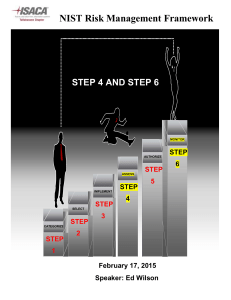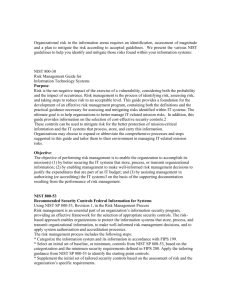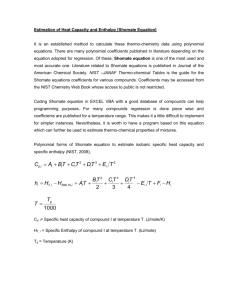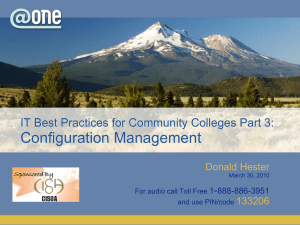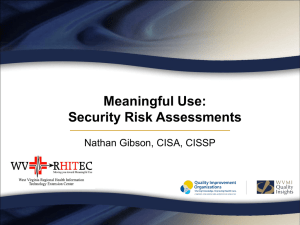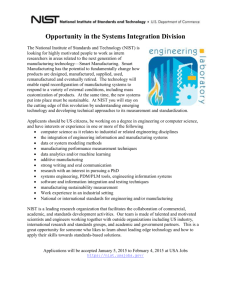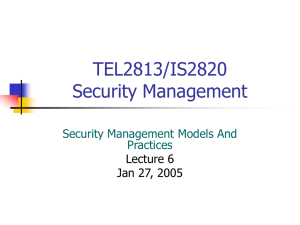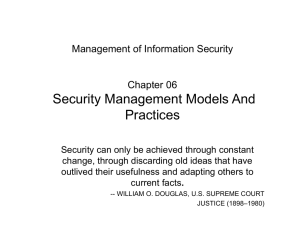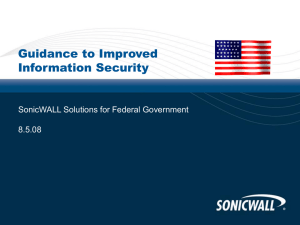NIST's Role in Securing Health Information - IEEE-USA
advertisement
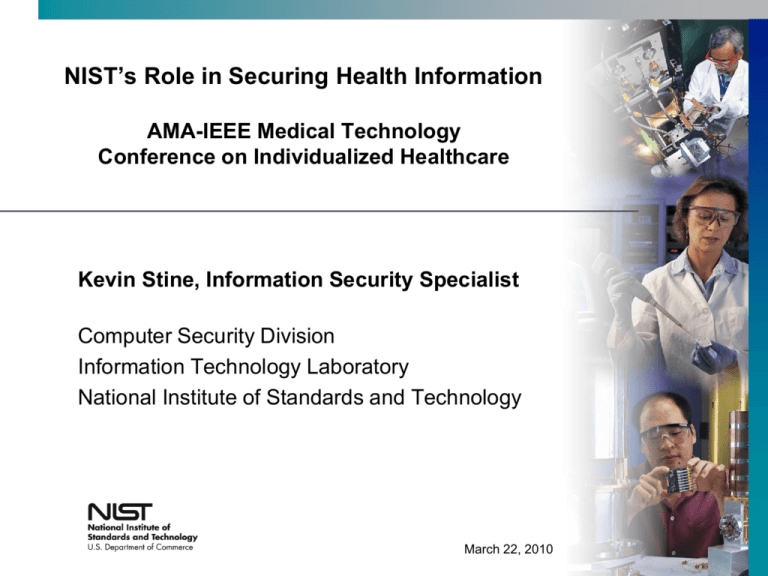
NIST’s Role in Securing Health Information AMA-IEEE Medical Technology Conference on Individualized Healthcare Kevin Stine, Information Security Specialist Computer Security Division Information Technology Laboratory National Institute of Standards and Technology March 22, 2010 NIST’s Mission To promote U.S. innovation and industrial competitiveness by advancing measurement science, standards, and technology … Credit: R. Rathe … in ways that enhance economic security and improve our quality of life. Credit: NIST 2 Computer Security Division’s Mission A division with the Information Technology Lab, CSD provides standards and technology to protect information systems against threats to the confidentiality, integrity, and availability of information and services … … in order to build trust and confidence in Information Technology (IT) systems 3 Agenda Meaningful Use, Standards, and Certification (Oh My) NIST HIT Security Activities… Past, Present, and Near Future Wireless and Mobile Technology Resources 4 Meaningful Use, Standards, and Certifications (Oh My) Meaningful Use (NPRM) Adopt and meaningfully use certified electronic health record (EHR) technology Stage 1(beginning in 2011): Ensure adequate privacy and security protections for personal health information. Standards and Certification (IFR) Represents the first step in an incremental approach to adopting standards, implementation specifications, and certification criteria to enhance the interoperability, functionality, utility, and security of health information technology and to support its meaningful use. Standards for HIT to protect Electronic Health Info (IFR, §170.210) Encryption and decryption of EHI, Record actions related to EHI, Verification that electronic health information has not been altered in transit, Crossenterprise authentication Certification Criteria (IFR, §170.302) Access Control, Audit Log, Integrity, Authentication, Encryption Agenda Meaningful Use, Standards, and Certification (Oh My) NIST HIT Security Activities… Past, Present, and Near Future Wireless and Mobile Technology Resources 6 Risk Management ORGANIZATIONAL VIEW Architecture Description FEA Reference Models Segment and Solution Architectures Mission and Business Processes Information System Boundaries Repeat as necessary Risk Executive Function Starting Point Organizational Inputs Laws, Directives, Policy Guidance Strategic Goals and Objectives Priorities and Resource Availability Supply Chain Considerations Step 1 CATEGORIZE Information Systems Step 6 MONITOR FIPS 199 / SP 800-60 Step 5 RISK MANAGEMENT FRAMEWORK Security Plan Step 3 Information Systems Plan of Actions & Milestones FIPS 200 / SP 800-53 Security Life Cycle AUTHORIZE SP 800-37 SELECT Security Controls Security State SP 800-37 / 800-53A Step 2 IMPLEMENT Step 4 Security Controls ASSESS SP 800-70 Security Controls SP 800-53A Security Assessment Report 7 Health IT Security - What We’ve Done… Standards Harmonization Outreach & Awareness Publications & Resources •Support ONC and HITSP in harmonizing and integrating standards to enable exchange of health information •Present on application of security standards and guidelines to HIPAA and HIT security implementations •HIPAA Security Rule Guide •HIE Security Architecture Health IT Security - What We Plan To Do… Security Automation •HIPAA Security Rule toolkit •Security configuration checklists HIT Test Infrastructure •Provide capability for current and future EHR testing needs against standards •Conformance and interoperability testing capabilities Agenda Meaningful Use, Standards, and Certification (Oh My) NIST HIT Security Activities… Past, Present, and Near Future Wireless and Mobile Technology Resources 10 Wireless and Mobile Technology Security Resources Wireless 800-127 Draft, Guide to Security for WiMAX Technologies 800-121, Guide to Bluetooth Security 800-120, Recommendations for EAP Methods Used in Wireless Network Access Authentication 800-97, Establishing Wireless Robust Security Networks: A Guide to IEEE 802.11i 800-48 Revision 1, Guide to Securing Legacy IEEE 802.11 Wireless Networks Mobile Technologies 800-124, Guidelines on Cell Phone and PDA Security 800-114, User’s Guide to Securing External Devices for Telework and Remote Access 800-101, Guidelines on Cell Phone Forensics 800-46 Rev 1, Guide to Enterprise Telework and Remote Access Security Thank You Kevin Stine kevin.stine@nist.gov Computer Security Division Information Technology Laboratory National Institute of Standards and Technology Computer Security Resource Center: http://csrc.nist.gov NIST Health IT Standards and Testing: http://healthcare.nist.gov 12
